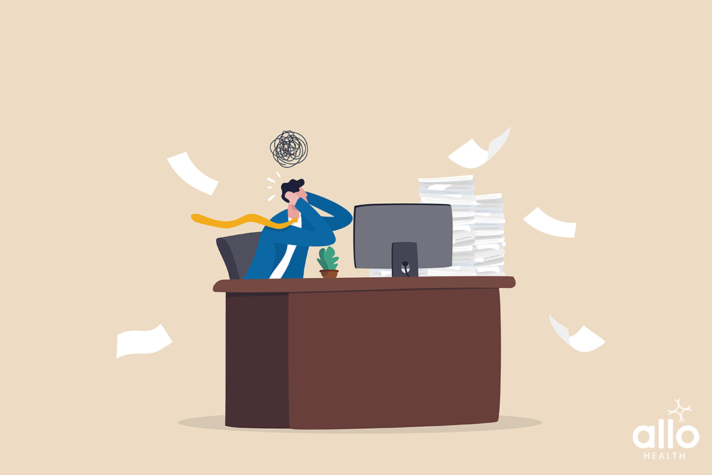Does Porn Cause Premature Ejaculation?

Allo Health is dedicated to personalized well-being, offering support and trusted information tailored to individual health goals. The platform emphasizes human-generated content, led by a distinguished medical team of experts, including physicians and sexual health specialists. Their commitment to credibility involves rigorous fact-checking, authoritative research, and continuous updates to ensure accurate, up-to-date information. Allo Health's unique approach goes beyond conventional platforms, providing expert-led insights and a continuous commitment to excellence, with user feedback playing a crucial role in shaping the platform's authoritative voice.

Ms Rachel graduated with a MSc. in clinical psychology from CMR university, Bangalore. With close to two years of experience in the field of Child and Adolescent Psychology.
Why This Was Upated?
Our experts continually monitor the health and wellness space, and we update our articles when new information became available.
Updated on 03 November, 2023
- Article was updated as part of our commitment to diversity, equity, and inclusion.

"The following blog article provides general information and insights on various topics. However, it is important to note that the information presented is not intended as professional advice in any specific field or area. The content of this blog is for general educational and informational purposes only.
Book consultation
The content should not be interpreted as endorsement, recommendation, or guarantee of any product, service, or information mentioned. Readers are solely responsible for the decisions and actions they take based on the information provided in this blog. It is essential to exercise individual judgment, critical thinking, and personal responsibility when applying or implementing any information or suggestions discussed in the blog."
Are you one of the countless people who have ever wondered, “does porn cause premature ejaculation?” If so, you’re not alone. This is a question that has intrigued medical professionals and individuals alike, seeking to understand the potential relationship between pornography consumption and sexual performance.
What Is Premature Ejaculation?
Premature ejaculation (PE) is a sexual dysfunction that occurs when a man consistently ejaculates before he or his partner desires during sexual activity. It is one of the most common sexual concerns among men and can cause distress and relationship concerns. PE is typically characterized by the following key features:
- Rapid Ejaculation: The primary symptom of premature ejaculation is the inability to delay ejaculation during sexual intercourse. This means that ejaculation occurs shortly after penetration, often within one minute or even before penetration.
- Lack of Control: Men with PE often report feeling a lack of control over their ejaculation. They may find it challenging to delay the climax, regardless of their desire to prolong the sexual experience.
- Negative Emotional Impact: PE can lead to various negative emotions, such as frustration, embarrassment, anxiety, and depression. These emotional responses can further exacerbate the concern and create a cycle of performance anxiety.
- Interference with Relationships: PE can strain intimate relationships because it may lead to dissatisfaction and frustration for both partners. The person with PE and their partner may feel dissatisfied with the sexual experience, leading to relationship conflicts.
- Primary and Secondary PE: Premature ejaculation can be categorized as primary or secondary. Primary PE refers to lifelong or recurrent concerns with early ejaculation that have been present since the person’s sexual debut. Secondary PE occurs later in life and can be triggered by factors such as stress, relationship concerns, medical conditions, or other psychological factors.
- Physical and Psychological Factors: The exact causes of PE can be complex and may involve both physical and psychological factors. Potential physical factors include hypersensitivity of the genital area, hormonal imbalances, or inflammation of the prostate gland. Psychological factors can include anxiety, performance pressure, relationship concerns, or a history of sexual trauma.
- Treatment Options: Various treatment options are available for managing premature ejaculation. These can include:
- Behavioral Techniques: Techniques such as the “start-stop” method or the “squeeze” technique can help individuals gain better control over their ejaculation.
- Medications: Certain medications, including selective serotonin reuptake inhibitors (SSRIs), are sometimes prescribed off-label to delay ejaculation. Topical anesthetics may also be used to reduce sensitivity in the genital area.
- Therapy: Psychotherapy, including cognitive-behavioral therapy (CBT) and sex therapy, can help individuals address psychological factors contributing to PE.
- Lifestyle Changes: Lifestyle modifications such as managing stress, practicing relaxation techniques, and maintaining a healthy lifestyle through diet and exercise can have a positive impact on PE.
- Seeking Professional Help: If premature ejaculation is causing distress or affecting the quality of your sexual life and relationships, it’s important to seek help from a healthcare professional or a therapist. They can assess your specific situation, identify potential causes, and recommend appropriate treatment options.
It’s worth noting that treatment approaches for premature ejaculation may vary from person to person, and the effectiveness of these approaches can also vary. It’s essential to consult with a healthcare provider to determine the most suitable treatment plan based on your individual circumstances. Early intervention and open communication with your partner can help improve sexual satisfaction and overall well-being.
Common Causes Of Premature Ejaculation
Premature ejaculation (PE) can have various underlying causes, and in many cases, it is a combination of physical and psychological factors. Understanding these causes can help individuals and healthcare professionals identify the most appropriate treatment strategies. Here are some common causes of premature ejaculation in detail:
- Psychological Factors:
- Performance Anxiety: One of the most common psychological causes of PE is performance anxiety. Anxiety about sexual performance, fear of disappointing one’s partner, or past negative sexual experiences can lead to heightened stress during sex, making it difficult to delay ejaculation.
- Stress and Anxiety: General stress and anxiety unrelated to sexual activity can also contribute to PE. High levels of stress can increase arousal levels and make it challenging to control ejaculation.
- Depression: Individuals with depression may experience changes in sexual function, including PE. The psychological effects of depression can interfere with sexual desire and control.
- Relationship concerns: concerns within a relationship, such as unresolved conflicts, communication concerns, or lack of emotional intimacy, can create tension during sex and contribute to premature ejaculation.
- Cultural or Religious Factors: Sociocultural or religious beliefs and values around sex and sexuality can influence a person’s sexual experiences. Feelings of guilt or shame related to these factors may contribute to PE.
- Physical Factors:
- Hypersensitivity: Some men have an overly sensitive penis, leading to heightened arousal and quicker ejaculation. This can be a primary physical cause of PE.
- Hormonal Imbalance: Hormonal imbalances, particularly related to thyroid hormones or testosterone, can affect sexual function, potentially leading to PE.
- Prostate concerns: Inflammation or infection of the prostate gland, known as prostatitis, can cause discomfort and lead to PE.
- Neurological Factors: Certain neurological conditions, such as multiple sclerosis or nerve damage from surgery or injury, can affect the ejaculatory reflex, leading to PE.
- Behavioral Factors:
- Masturbation Habits: Rapid and vigorous masturbation techniques that prioritize quick ejaculation can condition the body to respond similarly during partnered sex.
- Infrequent Sexual Activity: Long periods of sexual abstinence can make a person more prone to PE when sexual activity is resumed due to increased excitement and arousal.
- Genetic and Biological Factors:
- Genetics: There may be a genetic predisposition to premature ejaculation. If a man’s father or grandfather experienced PE, there may be a higher likelihood of him also experiencing it.
- Medical Conditions:
- Erectile Dysfunction (ED): Sometimes, men with erectile dysfunction may ejaculate prematurely due to anxiety or frustration related to their inability to maintain an erection.
- Medications and Substance Use:
- Certain Medications: Some medications, especially those that affect the central nervous system, can impact sexual function and potentially lead to PE.
- Substance Abuse: The use of alcohol, recreational drugs, or tobacco can affect sexual performance and may contribute to PE.
Many cases of premature ejaculation have multiple contributing factors. Accurate diagnosis and effective treatment often involve considering both the physical and psychological aspects of the condition. If you or your partner are experiencing PE and it is causing distress or relationship concerns, it is advisable to seek the guidance of a healthcare professional or a therapist who specializes in sexual health. They can help identify the specific causes in your case and recommend appropriate treatment options.
Does Porn Cause Premature Ejaculation?
The relationship between pornography (porn) and premature ejaculation (PE) is a subject of debate among researchers and clinicians. While there is no definitive evidence to suggest that porn directly causes PE, some indirect factors related to porn consumption might contribute to sexual difficulties, including PE, in some individuals. Here’s a detailed explanation of this complex relationship:
- Porn and Sexual Expectations:
- Unrealistic Expectations: Porn often depicts exaggerated or unrealistic sexual scenarios that may not accurately reflect real-life sexual experiences. Some individuals who consume a significant amount of porn may develop unrealistic expectations about sexual performance, such as the belief that they should last as long as the actors in porn scenes. This unrealistic expectation can create performance anxiety and potentially contribute to PE.
- Porn and Masturbation Habits:
- Frequency: Frequent or compulsive pornography use can lead to excessive masturbation habits. Rapid and vigorous masturbation techniques can condition the body to ejaculate quickly. When these habits are carried into partnered sexual encounters, they may result in PE.
- Sensory Overload: Watching porn while masturbating can provide an intense level of visual and sensory stimulation that is often absent during real-life sexual encounters. This heightened sensory experience may lead to difficulties in controlling arousal and ejaculation when engaging in actual sexual activity.
- Psychological Factors:
- Desensitization: Some studies have suggested that excessive porn use may lead to desensitization to sexual stimuli. Over time, individuals may require more explicit or extreme content to become aroused. This can potentially lead to difficulties with arousal and ejaculation during real sexual encounters.
- Individual Variability:
- Not Everyone is Affected: It’s important to note that not everyone who consumes porn will experience sexual difficulties, including PE. People’s responses to porn vary widely, and some individuals may have no concerns with their sexual function despite regular consumption.
- Other Factors:
- Coexisting Factors: It’s possible that individuals who experience both PE and consume a lot of porn may have underlying psychological or relationship concerns that contribute to both concerns. These concerns could be unrelated to porn consumption itself.
The relationship between porn and sexual difficulties like PE is multifaceted and can vary greatly from one person to another. Not everyone who consumes porn will experience sexual concerns, and many factors can influence an individual’s sexual function, including genetics, psychological factors, relationship dynamics, and physical health.
If you or someone you know is concerned about the impact of porn on sexual function or is experiencing PE, it’s advisable to consult with a healthcare professional or a therapist who specializes in sexual health.
They can help assess the specific factors contributing to the concern and recommend appropriate strategies or treatments to address it, which may include reducing or modifying porn consumption if it is deemed a contributing factor.
Frequently Asked Questions
(1) Does watching porn cause premature ejaculation?
No, watching porn itself doesn’t directly cause premature ejaculation (PE). Excessive porn consumption may indirectly contribute to PE in some individuals by shaping unrealistic expectations and affecting masturbation habits.
(2) Can porn affect sexual performance?
Yes, excessive porn consumption can affect sexual performance. It may lead to performance anxiety, unrealistic expectations, and desensitization to sexual stimuli, potentially contributing to concerns like PE.
(3) How does porn affect masturbation habits?
Porn can lead to rapid and vigorous masturbation techniques, conditioning the body to ejaculate quickly. These habits may persist during partnered sex, leading to PE.
(4) Can porn lead to unrealistic expectations about sex?
Yes, porn often portrays unrealistic sexual scenarios that can create expectations about sexual performance that are difficult to meet in real life, potentially causing anxiety and PE.
(5) Is porn use linked to desensitization?
Excessive porn consumption may lead to desensitization, where individuals require more explicit content to become aroused. This can affect arousal and ejaculation control during real sexual encounters.
(6) Does everyone who watches porn experience PE?
No, not everyone who consumes porn will experience PE. Responses to porn vary, and many factors, including psychological, relationship, and physical factors, influence sexual function.
(7) Can reducing porn consumption help with PE?
Reducing or modifying porn consumption may help in cases where it contributes to PE It may not be the sole solution and should be considered alongside other factors.
(8) Is there a recommended amount of porn consumption?
There’s no universally recommended amount of porn consumption. What’s essential is maintaining a healthy balance in your sexual life and addressing any negative effects it may have on your well-being or relationships.
(9) Are there benefits to reducing porn use?
Reducing porn use can lead to more realistic expectations about sex, improved intimacy, and better sexual performance. It can also free up time for other activities and reduce potential negative effects.
(10) Where can I seek help for PE related to porn use?
If you’re concerned about the impact of porn on your sexual function or are experiencing PE, consider consulting a healthcare professional or a therapist specializing in sexual health. They can provide personalized guidance and recommend strategies or treatments tailored to your specific situation.






































